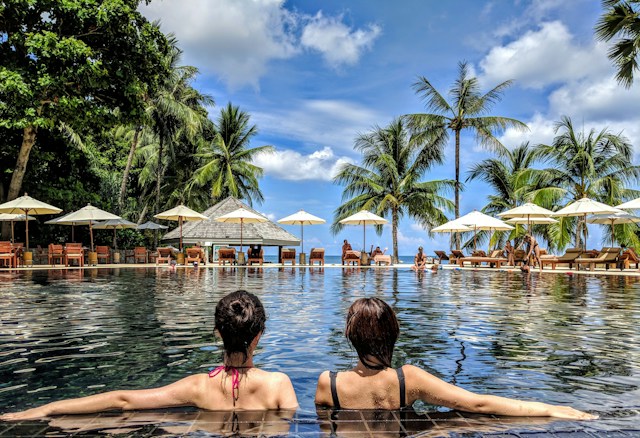Most of us begin daydreaming about, if not actually planning, our spring and summer vacations after the winter break. Of course, it’s easy to fall back on the same getaway every year—your family’s cabin, a well-known beach town, your preferred metropolis, or that resort the kids adored. There are advantages to spending our hard-earned money on things that provide comfort, consistency, and relaxation.
In my opinion, however, travel should often be used to accomplish the exact opposite: Get Out of your comfort zone, expose yourself to uncertainty, and give up rest to explore and educate. Personal development-increased emotional flexibility, empathy and creativity-is a result. My recent trip to Sri Lanka, which included an unplanned detour to Thailand, got me thinking more carefully about the benefits of a challenging experience.
The first advantage is increased emotional agility, or the capacity to notice when emotions develop, gather knowledge to identify potential causes, and then purposefully choose how to handle them. A study conducted on 485 individuals in the United States found that travel abroad was associated with a better ability to focus attention and energy, which is necessary for us to perform well in a variety of contexts and convey appropriate verbal and nonverbal cues about our feelings.These effects were strengthened by traveling to more countries (breadth) and by immersing oneself more deeply (depth), and they persisted even after the study participants returned home. Spending time in foreign towns, cities, or nations helps you grow more self-assured and tolerant of your own discomfort as well as more adept at navigating unclear situations.
Throughout my two weeks in Sri Lanka, I noticed this increase. Never before had I felt so alienated among a group of elderly, stocky guys speaking Sinhalese and wearing robes that were every color of the rainbow. I was aware that driving a rental car would not allow me to handle the winding roads with their tuk-tuks, bicycles, and pedestrians, and it was unsettling to think about having to pay cash for things like food, clothing, transportation, and artwork. But I ultimately found my way around. I even worked up the courage to attend a yoga class that was conducted only in Sinhalese after a few days on the ground. I now understand that whatever nervousness I may have at first is only a reaction, and it will pass as I start to function in it.
When your travels take you into unfamiliar area, your empathy level also rises. In the same American study, individuals who had visited other countries shown a higher capacity to hold off on making snap judgments about others until they learned more about them than just their age, sex, race, or ethnicity. Additionally, they were better at determining whether the behavior of another individual was due to a range of contextual conditions or ingrained personality traits. Similar affects on the exertion of effort to attend to major cultural differences in normalized values and behavioral patterns in ordinary social interactions were found when Chinese researchers surveyed 197 persons before and after their trip. Individuals who visited more nations became more tolerant and trusted of strangers, which changed their perspectives not only about strangers but also about their friends and coworkers back home. Their appreciation for those with fresh perspectives, abilities, and expertise increased.
On a city block in Sri Lanka, I saw an ivory Buddha statue in a glass enclosure surrounded by flashing neon lights; it seemed out of place to the natives, but not to me. I found it alarming that every few blocks there would be a police officer stationed with an assault rifle or machine gun, but as they smiled and struck up a conversation, I realized that these men in uniform were just going about their daily business. I was struck by how different the world of sport truly is when I went to the gym to work out on the elliptical machine and watched a Kabbadi match on the three television TVs hanging from the ceiling, which appeared to me like a dozen individuals playing tag.
Creativity is the third advantage of vacationing beyond the norm. In a two- to three-week international holiday, workers (46 in the Netherlands) were discovered to be able to come up with more and more creative uses for commonplace items like bricks, tires, spoons, and pencils. Researchers in Singapore have also discovered a connection between non-conventional problem solving and increased exposure to foreign cultures through travel, international friendships, language education, and foreign food and music consumption.
I began to approach my Well-Being Laboratory’s employment procedures differently after my most recent vacation experience. “How much do you know about our research group?” is still the best interview question I ask because it accurately predicts future job performance. Nevertheless, these days I also pose more peculiar queries, like, “If you could relive any moment in your life, what would it be and why?.” “What unusual beliefs do you hold?” and “What do you wish people had asked you about your childhood?” I question them again whether and how those experiences have affected their behavior and way of thinking. This is more than a pastime. To see whether any individuals can provide a fresh perspective that could boost our group’s creativity and provide value, I want to delve further into their cultural backgrounds. Rich and meaningful conversations happen, at the very least. At its peak, our team gains strength and insight.
My fortunate experience on an excursion served as the inspiration for this writing. However, I think that by moving closer to home—to new states, towns, and even homes, as well as from urban to rural, north to south, and east to west—it is conceivable to accomplish growth on par with that. You’re successful at broadening yourself as long as you’re spending time with people whose backgrounds and belief systems don’t quite align with your own.
Too many travels, both personal and business, are planned to reduce uncertainty and increase comfort. (Cruise ships and theme parks spring to mind.) However, holidays present an excellent chance for personal growth. Agile individuals who can be at ease in unpleasant situations, appreciate the viewpoints of others, and create rather than simply repeat what has previously been said are what today’s workplaces need. Even though you’re not at the workplace, you should still be taking care of yourself.





Have never been to the place is always full of curiosity, different customs, there are always different harvest.
New places are always full of freshness, and life is meant to be different.
Thank you for the author’s sharing. I have learned a lot.
The customs, scenery, and cuisine are all very tempting to me, so I must give it a try.